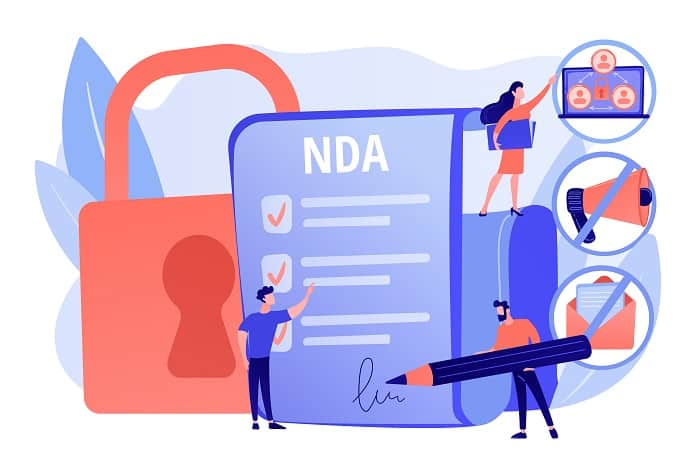Raveena Rani
Raveena is a seasoned International IP Counsel with a unique blend of engineering and legal acumen, specializing in Intellectual Property, Technology Law, and Corporate Transactions. She has extensive experience drafting and negotiating NDAs, commercial agreements, and legal documents in the areas of M&A, SaaS, and AI. Her global perspective is complemented by hands-on internships, corporate counsel roles, and mentoring initiatives. She thrives at the intersection of law, business, and technology.
Need any help? Contact us:

Table of Contents

A Non-Disclosure Agreement (NDA) is a contract where the involved parties agree to protect proprietary information by signing a legally binding contract. It is quite similar to a Confidentiality Agreement. Companies make use of NDAs when they are considering sharing valuable information pertaining to their business with another party. Learn the types of NDAs and the differences between Unilateral and Bilateral NDAs in this article.
As the contract ensures that all involved parties agree on the use of the shared information, it is an excellent legal tool to protect sensitive or proprietary information as well as trade secrets. It also sets restrictions and limitations on the use of the information which is agreed upon beforehand.
Hence, companies use Non-Disclosure Agreements to maintain the privacy or confidentiality of their information by legally binding the parties to the set terms. Breach of NDAs can have serious legal repercussions.
Depending upon the nature of work conducted in a company, they could require NDAs for various reasons. It could be used as a part of comprehensive communication within the company itself, where it is crucial to share some private or confidential information, or it could be a part of a company-company negotiation. Sometimes, companies have special trade secrets they do not want to let out to the public, and it can be used to safeguard this too. An example of this is the “secret spice mix” of KFC, a world-renowned fried chicken franchise. The company goes to great lengths to protect its secret recipe and very strict NDAs are put in place to do so.
However, NDAs are not like a one size fits all glove. They need to be prepared as per individual companies’ needs and according to the type of information-sharing relationship the parties have. The most common types of NDAs companies mostly use are:
Bilateral vs Unilateral NDA
Mainly there are 3 types of NDAS; Bilateral, Unilateral, and Multilateral NDAs.
Bilateral Confidentiality Agreement:
When two companies disclose confidential information with each other and both parties want to ensure that their shared information is protected and will not be shared with external parties a bilateral NDA is signed.
Unilateral Non-disclosure Agreement:
When two parties are involved in the agreement and only one of them is sharing confidential information, a unilateral NDA is signed to prevent the other party from disclosing the shared information. When only one company is obliged by an agreement it is a unilateral NDA.
At times, there can be more than 2 companies involved in business transactions involving secret or confidential information. So, if there are more than 3 parties, a multilateral NDA is used, and the disclosing party gets the other parties to promise not to disclose any information.
NDA in sales and marketing
Sales and marketing are quite communication-centric fields and as NDAs are all about protecting and ensuring that certain information is not shared, it is often used in various instances of the sales and marketing process.
In marketing as well as sales clients are often required to share sensitive information with their agencies or teams such as their user data and profiles or internal statistics. These are key data held by a company as they can be used to drive the direction of the company. So, to keep such information safe, while also allowing the team to make informed data-driven decisions, companies could use NDAs with their own sales and marketing team to ensure that such information is not leaked or shared with competitors.
Additional NDAs can also serve as an excellent marketing tool to drive sales too. While its primary function is legal protection, it can also be used for marketing. In the case of marketing, if companies are using agencies, they would like to have control over the secrecy of their intellectual property, and so NDAs can be used for this. Let’s revisit KFC here, they market their ‘secret 11 herb spice’ as the reason for their delicious fried chicken. It is used in all their promotional materials as their branding reflects this too. However, the herbs are a complete secret guarded by NDAs. This is an excellent example of how NDAs come into play in marketing.
As sales is a step-by-step process, NDAs have to be introduced with great care and the delivery time should be given quite some thought as well. You should be prepared for the moment you begin sharing confidential information and integrate or introduce NDA right before it. NDA is an unavoidable part of the sales cycle and is especially crucial if you are acquiring new business or funds.
Conclusion
Information can at times be a company’s most valuable asset and NDAs help protect such confidential information. The contract acts as a legal guarantee that the other party will not disclose any information shared.





